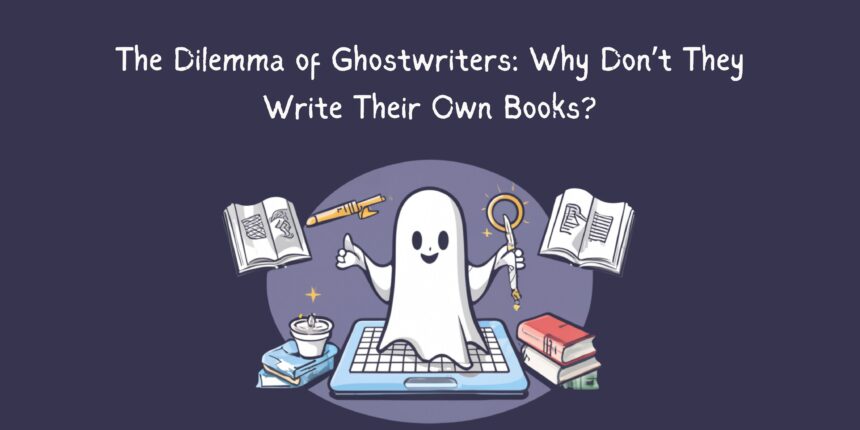Ghostwriting is not for everyone and the writers certainly shouldn’t be underestimated. Ghostwriting takes a very particular personality, thick skin, and the ability to ignore your ego as one dives head-first into someone else’s life. It is rewarding on occasion, especially when one is working with a person who may not have the writing skills but possibly a story that should be told.
When we talk about ghostwriters, many struggle to wrap their heads around why book ghostwriters put their heart and soul into writing something but do not take credit for it. Many people do not conceive the idea of not getting recognition for one’s labor which is fair because they are not thinking through a ghostwriter’s perspective. This blog will highlight the dilemmas of ghostwriters and why they don’t write their own books.
Perks and Drawbacks of Being a Ghostwriter
Understanding the pros and cons of being a ghostwriter aids others in understanding where one ghostwriter might be coming from and why they agree to do what they do. Here are the potential perks and drawbacks of being a ghostwriter:
- Ghostwriting offers several lucrative advantages for writers.
- It provides financial relief for freelance authors who may have lost money in self-publishing.
- The importance of getting paid cannot be overstated; if a project doesn’t offer payment, it’s not worth pursuing.
- Ghostwriters face minimal risk, as they are only responsible for writing and not for publishing the work.
- Their name often does not appear on the book, allowing them to maintain their overall sales record.
- Working with deadlines can help writers develop the ability to produce under pressure, increasing productivity and quieting the inner critic.
- Ghostwriting enhances collaborative skills by requiring openness to feedback and empathetic listening.
- It allows writers to broaden their range of writing styles by immersing themselves in someone else’s vision, enriching their writing in the process.
On the other hand, ghostwriting has several disadvantages.
- There are no royalties in ghostwriting, as most ghostwriting agencies‘ contracts are structured as work-for-hire, meaning writers receive a flat fee regardless of the project’s success.
- This can be particularly disheartening if the book later becomes a bestseller.
- There is a possibility that the work may never be published if the author decides against it or if the publisher loses interest.
- Ghostwriters may feel discouraged when authors do not consider their suggestions, leading to frustration if the author’s vision does not align with what is best for the story.
- A significant downside is the realization that the story does not belong to the ghostwriter, which can make the experience feel akin to any other job with limited creative freedom.
- This lack of ownership can render the ghostwriting experience somewhat bittersweet for many writers.
Why Don’t Ghostwriters Write Their Own Books?
Many ghostwriters do not publish their own work but rather hone their craft by assisting in the telling of other people’s stories. Providing Book ghostwriting services helps them run an array of styles and techniques in their writing. Through this, not only it help nurture their skills, but it will also generate a return for their efforts in the form of an income. Working for numerous clients allows the ghostwriter to work in more genres and on more topics than they may be interested in themselves, and often with more satisfaction.
The second significant factor is the emotional investment in your book. This is because ghostwriters may find it difficult to turn their mindsets from facilitators of somebody else’s vision into the creation of their own narrative. There is a lot of pressure in producing personal work that meets one’s standards since this is what they have been used to writing for clients who have specific expectations. Adding to that, the competition in publishing makes ghostwriters wary about writing their books.
Challenges of Balancing Client Work with Personal Projects
Perhaps the most prominent reason to consider why ghostwriters don’t work on personal projects is simply because they don’t have the time to. It may be tough to balance ghostwriting with one’s projects, but some effective strategies could enable the writers to tackle both these options quite effortlessly.
-
Setting Aside Time for Personal Writing
Establish specific blocks of time each week dedicated to personal writing. This methodology will allow ghostwriters to make progress on their own projects without distractions from the client’s paid work as well.
-
Inspiration from Clients’ Work
Treat each client project as a learning opportunity. Gain insights into different genres, styles, and storytelling techniques that can enhance personal writing.
- Embracing Collaboration
Collaborate with fellow writers to alleviate workload and introduce fresh ideas. This teamwork fosters creativity and creates a supportive environment.
-
Balancing Professional Commitments and Personal Aspirations
By implementing these strategies, ghostwriters can effectively manage their professional responsibilities. This balance allows them to pursue their writing goals while adding value to both aspects of their careers.
Conclusion
The question of why ghostwriters don’t write their own books is multi-layered. Though the financial benefits from ghostwriting are big, and it is an opportunity to improve one’s craft in a very special way, some sacrifices involved stand on the other side of the balance. The emotional investment to transition from supporting another person’s vision to creating their own narrative could be overwhelming for ghostwriters, putting them under pressure and suspecting their capability.
Besides that, the time allocated to work on the clients’ projects reduces the window to undertake personal writing; hence, ghostwriting is one busy activity that does not allow extra time to pursue personal creations. Many book ghostwriters, irrespective of difficulties, pride themselves on their work by getting great experience and knowledge from the stories told by clients. They can apply knowledge and skills in personal writing endeavors. With everything said and done, while the world of ghostwriting holds its share of dilemmas, so too does it hold ways to grow and find the discovery that ultimately proves that helping in telling others’ stories paves the way for their own stories to surface in due time.
Also Read: Healthy and Insured





